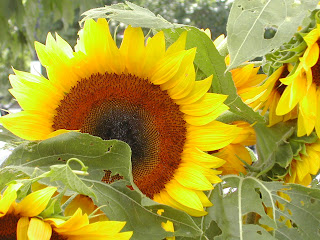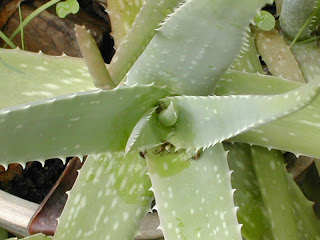
"That really gets my goat!" my mother would say. This is something that really "gets" me. Waste and the apparent disinterest on the lack of most Americans in making a difference for the environment. 'Scuse me while I hop up on my soapbox for a minute. . .
I understand that some people just don't care about nature. They maybe hate trees due to an unfortunate incident when they were small, or fear grass because of it's pointy-ness--I'm grasping here. So it
sort of makes sense that they wouldn't give a hoot about nature or the environment. But what about the rest of us? Those who adore spending time hiking and gardening and playing in the dirt. The farmers who work the soil, the mothers that like bringing their children to the park and playing a game of pickup softball, the men who love extreme Frisbee and mountain biking? How does such a disconnect happen between us (humans) and the natural world? What allows us to shut off the voices that tell us that dumping chemicals into our gardens and rivers, and driving huge, gas-guzzling SUVs because they're "in"? How do we decide as a society that it doesn't matter if people in other countries don't have enough resources, as long as we Americans have all we need?
To me the lack of interest in, and worry over, the environment ties into our whole consumer culture. I like to call this the Christmas Tree Shop mentality. Have you ever seen commercials for this store? If not, consider yourself lucky. The commercials generally show women parading around the store, snatching things of the shelves and immediately turning them this way and that to find the price tag. "Oh, look Marge. Isn't this a cute potholder? And it's only $.99! I'm getting five!" Plunk, plunk, plunk as Alice throws handfuls of potholders, which she may or may not ever use into her hugely full, towering cart of crap.
But it's worse in real life as I would guess that 90% of the items in this store aren't necessary to daily living. This is not to say that I never shop there. Occasionally, I have found nice books, cards, or gift wrap for presents. And once in awhile I do pick something up there because it's inexpensive, like tea light candles or flower bulbs. But I can't help but notice that mentality more and more--not just in this one store either. It's like shopping and having more than everyone else has become some sort of national disease. And where are we putting all this stuff? Sometimes we store it in little extra "closets" a.k.a. storage units that we pay for each month. Sometimes we fill our houses with it to the point where it's not even comfortable getting around. But eventually most of it, nearly all I would guess, ends up in the landfill.
I guess I just wonder how we, as Americans, have turned from a country of do-it-yourselfers into a culture of wasters. I wonder what our grandparents would think, or the founding fathers of this country, if they saw where we are now. We're ruining the environment to make things "better" for ourselves. We've stopped questioning government policies that allow the total annihilation of once perfectly natural environments. We are addicted to oil and shopping, and having more, more, more. And all of this at our own expense, or at the expense or other people who we share the planet with who are less fortunate than ourselves.
I'm re-reading a wonderful book right now, called "
Serve God, Save the Planet". It is in the Green Lending Library to be borrowed (or will be in a few days). It is written by J. Matthew Sleeth, M.D., a man who once "had it all". He worked as a bigwig doctor and had a huge house, a flashy sports car and everything else that the so-called American Dream tells us successful people have. He and his family, however, changed their ways after they realized how out of line their choices were compared to their values. Sleeth shares in his book how important that realization was to him.
"After I became a Christian, I went through a process of examining my life. It was filled with sin and hypocrisy. . . At the time, I considered myself an enlightened environmentalist. The United States uses more resources than any other country in history, and my crude audit showed that my family used slightly more energy than the average American household. Despite our modest recycling, carpooling, and electricity conservation efforts, we were living an unsustainable lifestyle. We were going about living our life as if we were the center of the universe, and there was no tomorrow to protect." --J. Matthew Sleeth, M.D.
Serve God, Save the Planet
I am certainly not saying that I'm immune to the gimmees, that I never waste gas on unnecessary trips, that I always think first of other people and the environment when I'm shopping. But I do try, and I think it's important that we all try, to be more conscious of our choices. How does buying sweatshop made goods affect people? How does buying conventional versus organic products affect our planet and the workers who farm the fields their grown in? How does my deciding I need a big SUV for my safety affect the person whom I collide with and who is hurt in their modest sized or small car? How does adding chemical fertilizer to my garden affect my neighbor's children who's well is located near my yard?
Just being conscious is the difference. Can't sell your SUV? Maybe you could use it less or use public transportation more. Don't have the money to buy all organic foods? What about at least avoiding the foods with the highest amount of pesticides in them? Can't afford all sweat-shop free clothes? Try used. This saves money and resources as you're keeping one more thing out of the landfill.



